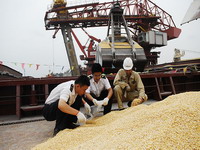AQSIQ Food Policy
Import and export food inspection and quarantine supervision and management measures” from 01 July, 2016 implemented.
AQSIQ released Announcement No. 177 on the “import and export food inspection and quarantine supervision and management measures,” the new policy will be formally implemented July 1, 2016.
Food is the most basic and important life, production materials, plays an irreplaceable role in the national economic and social development. Food security and financial security, energy security is listed as a country’s economic development, the three security.

Entry inspection and quarantine of food is closely related to food security. First, food imports is a beneficial supplement domestic food supply, is closely related to food security. Secondly, the food import quarantine related to the environment, is closely related to food safety. Third, import of food safety and hygiene and quality inspection, food consumption is closely related to security.
AQSIQ attaches great importance to the entry of food inspection and quarantine management. In December 2001, has developed and implemented “Entry-Exit Inspection and Quarantine of food and feed management practices” (AQSIQ Announcement No. 7). With the changes in the trade situation and China’s relevant laws and regulations, especially with food imports exceeded 100 million tons, a large number of food imports intercepted quarantine pests, health and safety issues continue to find Seed contamination, mycotoxins, and other unauthorized genetically modified. To sum up recent food inspection and quarantine supervision practice and experience China’s import and export, consolidation of Chinese food inspection and quarantine international multilateral and bilateral cooperation and exchange results. Better fulfill “to ensure safety and promote development” duties.
Since 2011, AQSIQ organized approach to revision and improvement on the original, which lasted six years, the formation of the new policy.
The new policy has the following main changes:
- First in terms of policy restructuring and rich content on. The original total of 31 chapters, which are: General 4, quarantine 4, entry inspection and quarantine 10, 7 exit inspection and quarantine, inspection and quarantine supervision and management 3 and Annex 3. The new approach to food 61 seven chapters are: General 5, entry inspection and quarantine of 19, 8 exit inspection and quarantine, risk management and supervision of 11, 14 and Liability Annex 4. Among them, Chapter 4, “Risk Management and Supervision”, Chapter 5, “legal responsibility” are the new way to emphasize the new content. Other chapters are made corresponding adjustments to enhance operability.
- Highlight of the grain risk management, source management, process management features. The new approach for the entry of food long process, many links, high-risk characteristics of the pre-entry quarantine access, quarantine license, specify the port of entry, on-site inspection, laboratory testing, fixed-point processing after entry, surveillance as the focus of the inspection and quarantine supervision, the establishment of the whole process of risk monitoring system. The first is through the access system, licensing system to control the source of quarantine risk.
- Access system means without access to foreign grain can not enter the Chinese market, and only after a risk analysis by the official exporter of food to take risk control measures before exports to China, which is the official requirements of the exporting country to assume management responsibilities source.
- Quarantine permission is requested before access to food has been exported to China, the need to bid for quarantine permission, clear foreign companies exporting into China and should meet the quality and food safety requirements.
- The second is through designated ports, the designated processing plant epidemic monitoring and control system for food entry unloading, transport, processing risks.
- The third is to improve the import and export of food risk management capability through risk classification, risk warning, risk monitoring, risk management and control measures. Highlighting the main responsibility of enterprises and overseas Chinese food processing storage transport enterprises into the regulation. Business is the import and export of food production and operation of the subject and the first responsible person.
Registration system to adjust in the new policy:
Redefining the concept of the new food policy:
 AQSIQ released Announcement No. 177 “Chinese version”
AQSIQ released Announcement No. 177 “Chinese version”
In case of any discrepancies between the Chinese version and the English version, the Chinese version shall prevail !




